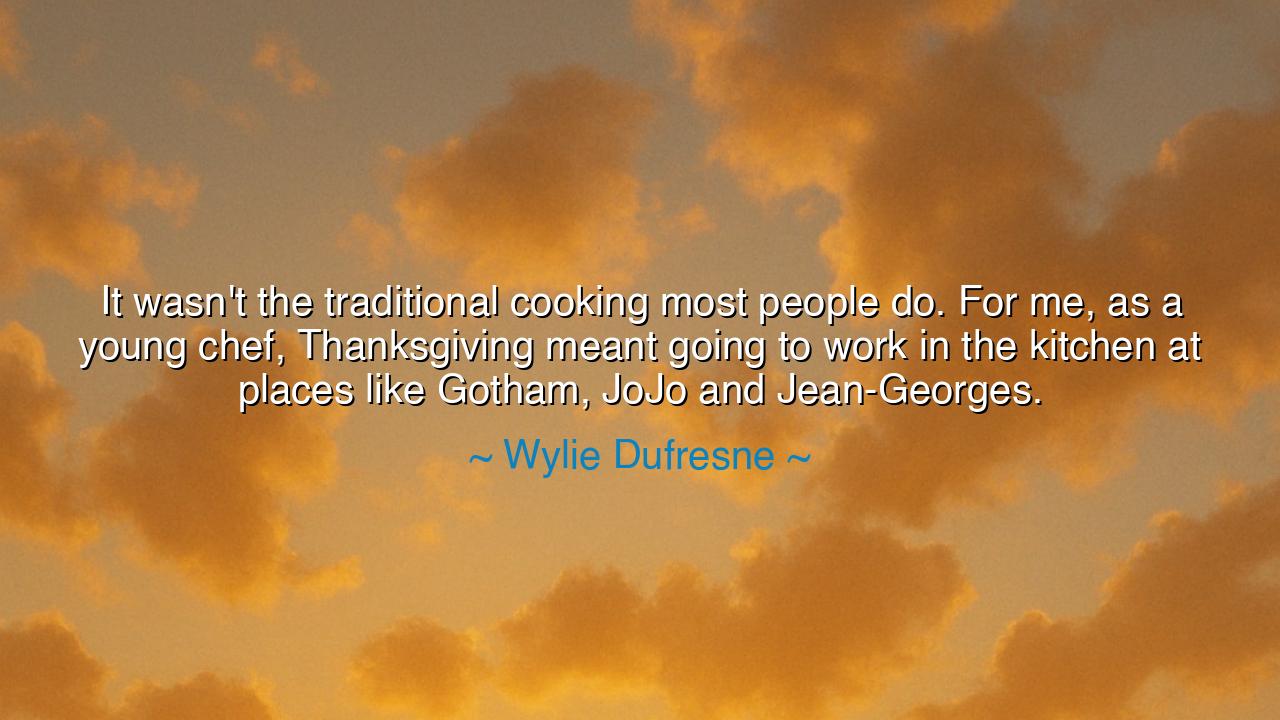
It wasn't the traditional cooking most people do. For me, as a
It wasn't the traditional cooking most people do. For me, as a young chef, Thanksgiving meant going to work in the kitchen at places like Gotham, JoJo and Jean-Georges.






In the reflective words of Wylie Dufresne, there is revealed a truth about labor, calling, and the sacrifices demanded by one’s craft: “It wasn’t the traditional cooking most people do. For me, as a young chef, Thanksgiving meant going to work in the kitchen at places like Gotham, JoJo and Jean-Georges.” These words may sound simple, yet they carry the weight of a life shaped by discipline and devotion. For while others gathered around tables of family and feasts, his path led him into the fire of professional kitchens, where tradition was transformed into artistry, and duty replaced leisure.
The heart of the quote lies in the distinction between the traditional cooking of home and the relentless demands of the professional kitchen. To many, Thanksgiving is a time of rest, of reunion, of familiar recipes passed down through generations. But for Dufresne, in the early years of his career, the day meant long hours at the stove in places of prestige, serving not his own family but the families of others. This is the paradox of the chef—that their art gives joy to the world even as it often requires them to sacrifice their own seat at the table.
The ancients knew this paradox well. Consider the artisans of Athens who labored over the great temples—not to dwell in them, but to create sanctuaries for others. Or think of the priests of old, who presided over feasts and sacrifices but often did not partake in the same way as the worshippers they served. The one who ministers to others, whether with food, words, or craft, often gives up what they themselves most long for. Dufresne’s words echo this timeless truth: to serve is to sacrifice.
Yet there is also a nobility in this sacrifice. By choosing the kitchen at Gotham, JoJo, and Jean-Georges, he was not abandoning tradition but reshaping it. For him, Thanksgiving became not about turkey and stuffing, but about discipline, mastery, and the pursuit of excellence. The joy of the holiday was not in resting, but in rising—to meet the challenge of his craft, to honor the mentors who trained him, and to contribute to the lineage of culinary greatness. What others saw as work, he embraced as purpose.
History gives us other examples of this transformation. The painter Michelangelo did not celebrate his days in leisure but spent them on scaffolds, laboring over the Sistine Chapel ceiling while others feasted and worshipped beneath. The soldier George Washington, at Valley Forge, did not pass the winter in warmth, but in the cold and struggle that preserved his nation’s hope. Their holidays were not like others’—they were forged in duty and vision. So it is with the young chef: his feast was not on the plate before him, but in the creation of the plates placed before others.
The lesson here is clear: greatness often requires sacrifice, and the path of mastery may look different from the path of tradition. Do not begrudge the hours spent in labor when others rest, if that labor aligns with your calling. The feast you miss today may become the foundation of what you will one day give to the world. And though the young chef may not sit at the family table, his craft allows countless others to gather and celebrate in joy.
Practical wisdom flows from this. If your duty takes you from tradition, do not despair. Find meaning in the work itself, and know that your sacrifices are not in vain. If you labor while others feast, remember that service itself can be holy, and that your contributions may become the unseen foundation of another’s gratitude. And when you can, create your own moments of gathering, your own feasts, to remind yourself of why you serve.
Thus, in the words of Wylie Dufresne, we are reminded that Thanksgiving and tradition are not always the same. For some, it is a day of family and food; for others, a day of work and sacrifice. Yet in both, there can be gratitude: gratitude for the chance to serve, to create, to pursue one’s calling with devotion. And in this truth, we see that the spirit of the feast is not only at the table, but also in the fire of the kitchen, where hands and hearts labor so that others may be nourished.






AAdministratorAdministrator
Welcome, honored guests. Please leave a comment, we will respond soon